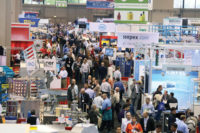Although the category has not been recession proof, U.S. retail functional food and beverage sales still grew by 6 percent to an estimated $31 billion in 2008 from $29 billion the year before, according to market research publisherPackaged Facts.
In its new report, “Functional Foods and Beverages in the U.S., 4th Edition,” the New York City-based firm noted that several functionally oriented food and beverage categories performed well between 2003 and 2008. These have included yogurt, energy drinks, nutritional snacks and trail mixes, milk substitutes and soymilk, and refrigerated blended fruit drinks, among others.
Packaged Facts projects that total U.S. retail sales of functional foods and beverages will continue to grow at a steady pace through 2013, and reach approximately $43 billion.
“Consumers are reevaluating their health, nutrition, and lifestyle choices adopted years ago,” says Tatjana Meerman, Packaged Facts publisher. “This reevaluation includes considering the role functional foods and beverages could or should play in diets in order to avoid or help treat all kinds of health conditions. This new, proactive approach is fundamentally different from the reactive tendencies of consumers in the past who only treated health problems after they arose.”
Packaged Facts noted the functional food category has advantages that could prevent it from being as vulnerable to recessionary impacts. In the short term, Meerman suggests that functional products may save consumers money since these foods and beverages carry nutrients that shoppers would otherwise seek in expensive nutritional supplements. In the long run, functional products could save consumers money on medical expenses by helping to prevent illness and chronic conditions.
Functional foods "not recession proof" but growing
Looking for a reprint of this article?
From high-res PDFs to custom plaques, order your copy today!






